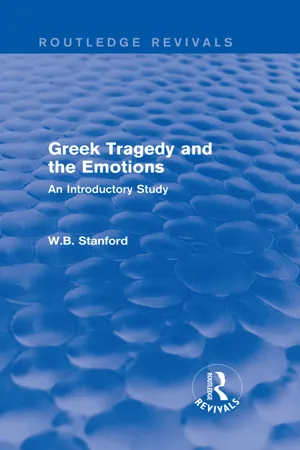
- 192 pages
- English
- ePUB (mobile friendly)
- Available on iOS & Android
About this book
According to Aristotle the main purpose of tragedy is the manipulation of emotions, and yet there are relatively few accessible studies of the precise dynamics of emotion in the Athenian theatre.
In Greek Tragedy and the Emotions, first published in 1993, W.B. Stanford reviews the evidence for 'emotionalism' – as the great Attic playwrights presented it, as the actors and choruses expressed it, and as their audiences reacted to it. Sociological aspects of the issue are considered, and the whole range of emotions, not just 'pity and fear', is discussed. The aural, visual and stylistic methods of inciting emotion are analysed, and Aeschylus' Oresteia is examined exclusively in terms of the emotions that it exploits. Finally, Stanford's conclusions are contrasted with the accepted theories of tragic 'catharsis'.
Greek terms are transliterated and all quotations are in translation, so Greek Tragedy and the Emotions will appeal particularly to those unfamiliar with Classical Greek.
Frequently asked questions
- Essential is ideal for learners and professionals who enjoy exploring a wide range of subjects. Access the Essential Library with 800,000+ trusted titles and best-sellers across business, personal growth, and the humanities. Includes unlimited reading time and Standard Read Aloud voice.
- Complete: Perfect for advanced learners and researchers needing full, unrestricted access. Unlock 1.4M+ books across hundreds of subjects, including academic and specialized titles. The Complete Plan also includes advanced features like Premium Read Aloud and Research Assistant.
Please note we cannot support devices running on iOS 13 and Android 7 or earlier. Learn more about using the app.
Information
Table of contents
- Cover
- Half Title
- Title Page
- Copyright Page
- Original Title Page
- Original Copyright Page
- Table of Contents
- Preface
- 1 The centrality of emotionalism
- 2 The conditions of performance
- 3 The emotions of Greek tragedy
- 4 The aural element I: song, music, noises, cries and silences
- 5 The aural element II: the music of the spoken word
- 6 The visual element
- 7 Emotionalism through vocabulary and stylistic figures
- 8 Emotionalism through subject-matter, imagery, irony and structure
- 9 The tragic emotions in the Oresteia
- 10 The ultimate effect?
- Abbreviations
- References
- Works cited
- Index 1 Proper names and dramatic characters
- Index 2 General topics
- Index 3 Selective list of Greek terms
- Index 4 Passages quoted from Greek tragedy